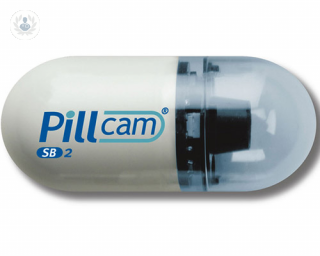Capsule endoscopy
Dr Carlo Nunes - Gastroenterology
Created on: 11-13-2012
Updated on: 09-06-2023
Edited by: Jay Staniland
What is a capsule endoscopy?
A capsule endoscopy is a minimally invasive method of examining the digestive system. It was a breakthrough in the study of the digestive system due to its capacity to allow specialists to observe and diagnose injuries and conditions of the entire digestive tract, not only a part of it.
Unlike a gastrointestinal endoscopy (in which a flexible tube with a camera is inserted through the mouth), a capsule endoscopy does not cause discomfort or risk of injury. However, a gastrointestinal endoscopy provides the opportunity to take biopsies or perform some treatments during the examination. This is not possible with a capsule endoscopy.

What does a capsule endoscopy consist of?
Before swallowing an endoscopic capsule, patients are required to go through a fasting period. The length of this fasting period will be specified by a doctor.
A capsule endoscopy simply involves swallowing a small capsule with a micro-camera inside it. This camera transmits images of the digestive tract while it passes through it. The capsule will move through the body due to natural contractions in the digestive system and will eventually be expelled naturally through the anus one to two days later.
Why is an endoscopic capsule used?
The endoscopic capsule is used to diagnose or evaluate the following conditions:
- chronic anaemia
- gastrointestinal haemorrhage (bleeding)
- Crohn's disease
- small intestine neoplasms
- coeliac disease
- tumours
- intestinal malabsorption
- unexplained chronic abdominal pain
Preparation for the endoscopic capsule
Your specialist will likely recommend the following:
- Avoid medicines that contain iron for at least ten days before the test.
- A low-fibre diet for at least three days before the test.
- Maintain a liquid diet the day before.
- Take a laxative solution 24 hours before the test to cleanse the intestine.
- Do not eat 8 hours before the test.
What does it feel like during the test?
The person taking the capsule won’t be able to feel it inside them. Instead, they will feel the same as they usually do.
What do abnormal results mean?
If the images from the capsule don’t identify any conditions or problems, the digestive system will very likely not have the condition in question. Sometimes, results show that the patient has Crohn's disease, intestinal bleeding, neoplasms, anaemia or other conditions, which will then be addressed and treated by a specialist.

















